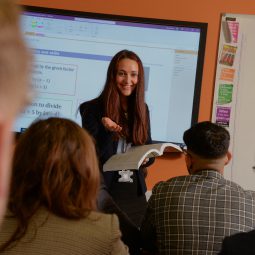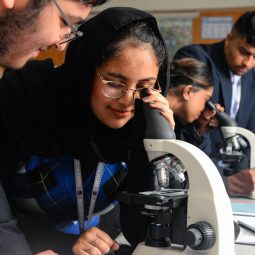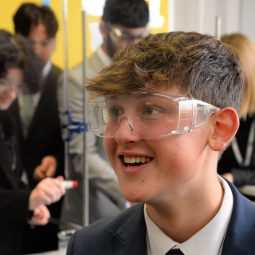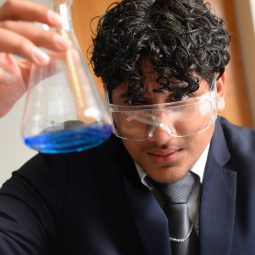Applied Science
Level 3 Certificate/Extended Certificate in Applied Science (AQA)
Science is a subject that affects all aspects of our lives. For example, by advancing knowledge in stem cell research, leading to the development of new treatments for serious illnesses.
Despite this, the media perception of science is not always positive, and is often down to a lack of understanding of the science being discussed. Scientific advances often raise moral and ethical issues – is it right for the NHS to pay for a very costly life saving drug to treat cancer when cuts are being made in other areas? What issues are raised by the potential of three parent babies? Science often asks more questions than it answers, and this course will equip you with the knowledge and the skills to make your own judgements on scientific issues.
Course Content & Assessment
Year 12
Unit 1: Key Concepts in Science
16.6% of Extended Certificate
A written exam
This exam includes questions based on chemistry, physics and biology, with a mixture of short and longer answer questions.
Unit 2: Applied Experimental Techniques
16.6% of Extended Certificate
Assessed practical work
This unit is based on practical work linked to unit 1, and is internally assessed with external moderation. You will carry out 6 investigations and present detailed scientific reports for each one.
Unit 3: Science in the Modern World
16.6% of Extended Certificate
A written exam
AQA provide annual pre-release materials including scientific papers, articles and blog posts on topical scientific issues discussed in the media. Previous topics have included: designer babies, space exploration and CRISPR cancer treatment to name but a few. You will analyse and evaluate scientific information, develop critical thinking skills and communicate your understanding of these scientific ideas through a series of comprehension and data analysis questions.
Year 13
Unit 4: The Human Body
16.6% of Extended Certificate
A written exam
This unit focusses on human anatomy and physiology, with applications in the health sector. It builds on units 1 and 2 where the knowledge and practical skills gained are applied to human biology.
Unit 5: Investigating Science
16.6% of Extended Certificate
Assessed practical work
This unit allows students to use the knowledge gained during the course in an extended practical investigation. The students first plan and then carry out the investigation before writing a detailed report. This report is internally assessed with external moderation.
Unit 6a: Microbiology Portfolio
16.6% of Extended Certificate
Assessed practical work
This unit will develop your knowledge and understanding of key microbiological concepts and techniques used in biotechnological industries. The unit has a significant number of practical experiments. You will produce a portfolio for this, which is internally assessed with external moderation.
Teaching
The examined units will involve a mixture of taught material and independent research. In particular, preparation for unit 3 will involve in depth discussions about topical news items and the issues that arise from these developments.
The practical work in unit 2 closely follows the examined work in unit 1 with an emphasis on interpreting data and drawing conclusions.
Units 5 and 6 in year 13 will follow large extended projects, where an emphasis will be on time management and organisation.
Your Future
The Applied Science qualification is useful where a broad scientific knowledge is required.
This qualification is supported by a range of universities, and when taken alongside other qualifications, can fulfil the entry requirements for several science-related higher education courses. These include physiotherapy, biomedical and sports science, and is particularly relevant to those wishing to undertake a vocational course such as nursing.
The Blue Coat Sixth Form is proud to be part of the Cranmer Education Trust
Cranmer Education Trust is a company limited by guarantee and an exempt charity registered in England. Company registration number: 07687709. Registered Office: Cranmer Education Trust, c/o The Blue Coat School, Egerton Street, Oldham OL1 3SQ. The website address is www.cranmereducationtrust.com and the phone number 0161 785 5082.









